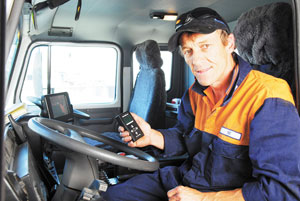Chain of Responsibility (CoR) is a reality for anyone involved in transportation. For the waste sector, where the chain extends from truck operator to transfer station and landfill, the legislation poses repercussions for those not following a code of practice within their industry.
CoR legislation specifically applies to vehicles in excess of 4.5 tonnes.
It was originally drafted by the National Transport Commission (NTC) in 2003, and approved by the Australian Transport Council of Ministers (ATC) in 2004. Since this time, each State has been preparing its own laws to have the same effect in every State.
CoR is similar to the legal concept of ‘duty of care’, which underpins OH&S law.
According to CoR consulting company, BulkNet, anyone who operates a heavy vehicle, regardless of whether or not they own it, needs to be CoR compliant.
If they are not, they will be held legally accountable if their actions, inactions or demands cause or contribute to breaches of road transport law.
BulkNet works closely with road authorities nationally to educate industry on what is required of them to meet the standard.
Penalties and sanctions under the road law range from formal warnings to court imposed fines and penalties.
Organisations that compromise road safety standards can be held liable and fined up to three times the amount of profit gained while breaching the standards.
“Considering a ‘substantial breach’ is viewed by the legislation as exceeding the permissible Gross Vehicle Mass (GVM) by only five per cent, the parameters for overloads are quite narrow and more caution needs to be applied to vehicle mass loading practices in order to stay legal,” said Bulknet’s National Business Development Manager, Nik Maljkovic.
“While many astute operators have safeguards in place to conform to the legislation, some operators are reluctant to invest in the costs of conforming and are unsure of the benefits that can be gained.
“A popular exercise to minimise the risk of a mass breach is to underload, but this can be very difficult to manage in the waste business considering the unknown weight factor for each bin collection.
“In our experience, there are waste operators out there who attempt to underload their trucks on average between five to eight per cent and that means wasted time and productivity.”
With a fleet of 15 waste trucks, being positioned at the forefront of road compliance was a top priority for the City of Hume in northwestern Melbourne.
“The biggest risk for us came with not knowing what was in the rubbish bin we were loading,” said Waste Team Leader Trevor Pickett.
“At times, each of our trucks pick up over 1,200 bins a day and the inconsistency in these sorts of loads means you never know whether you are picking up bubble wrap or something illegal like a dozen car batteries.
“In the past it was difficult to know our weight until we would get back to the weighing station, but since fitting the Bulknet weighing solution to our fleet, our drivers now have the control to measure what they load from the comfort of their cab.”
Trevor Pickett said the Bulknet system is working well for Council as it is easy to use and provides drivers with the tools to ensure they don’t overload.
“The feedback from our drivers is that they now feel more informed and in control of what they are loading,” he said. “As a Council, it is important that we are seen to be complying with all legislation and ultimately setting a benchmark for all road users.”
With the potential advent of an Emissions Trading Scheme and overwhelming public pressure to reduce industry’s impact on climate change, it is becoming increasingly necessary to address corporate carbon footprints, and government bodies in particular are rushing to lead the way.
Bulknet say the correct loading tools, policies and procedures will reduce fuel consumption and exhaust emissions, while enhancing corporate image, reputation and potentially reducing exposure to any ETS.
For further information contact Nik Maljkovic on (03) 9768 4555 or Trevor Pickett on
0419 107 843.

















